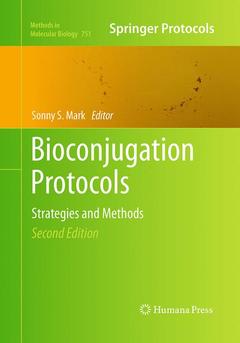Description
Bioconjugation Protocols (2nd Ed., 2nd ed. 2011)
Strategies and Methods
Methods in Molecular Biology Series, Vol. 751
Language: English
Subjects for Bioconjugation Protocols:
Support: Print on demand
605 p. · 17.8x25.4 cm · Hardback
Description
/li>Contents
/li>Comment
/li>
Contemporary approaches to the synthesis of chemically modified biomacromolecules (proteins, nucleic acids, lipids, and carbohydrates) not only require efficient means to control conjugation and the specific site of attachment of the conjugated moiety but also the effective use of recent developments in the fields of pharmaceutical chemistry, biomolecular/polymer engineering, and nanobiotechnology. In this second edition of Bioconjugation Protocols: Strategies and Methods, expert researchers update the classic methods and introduce valuable new approaches that go beyond basic conjugation techniques to include elements from advanced organic synthesis, molecular biology, surface biotechnology, materials science, and nanobioscience/engineering. These readily reproducible methods cover the preparation of biomolecular conjugates using a variety of labeling techniques and semisynthetic approaches. Additional chapters address the biofunctionalization of surface structures, including organic/inorganic thin films, as well as various types of nanostructures (magnetic nanoparticles, quantum dots, carbon nanotubes, and silicon nanowire devices). All the protocols follow the successful Methods in Molecular BiologyTM series format, each one offering step-by-step laboratory instructions, an introduction outlining the principle behind the technique, lists of the necessary equipment and reagents, and tips on troubleshooting and avoiding known pitfalls.
Cutting-edge and highly practical, Bioconjugation Protocols: Strategies and Methods, Second Edition offers both novice and experienced researchers access to the broad array of techniques needed to carry out the semisynthesis of functional biomolecular reagents and/or the biofunctionalization of surfaces and structures of unique interest for a widevariety of applications, ranging from novel biomedical diagnostics to powerful new therapeutics to advanced biomaterials.
Site-Specific Labeling of Proteins for Single-Molecule FRET Measurements Using Genetically Encoded Ketone Functionalities.- Enzymatically-Catalyzed Conjugation of a Biodegradable Polymer to Proteins and Small Molecules Using Microbial Transglutaminase.- Synthesis of Drug/Dye-Incorporated Polymer-Protein Hybrids.- Dye/DNA Conjugates as Multiple Labels for Antibodies in Sensitive Fluorescence Immunoassays.- Chemoselective Modification of Viral Proteins Bearing Metabolically Introduced ‘Clickable’ Amino Acids and Sugars.- Preparation of Peptide and Other Biomolecular Conjugates through Chemoselective Ligations.- New Fluorescent Substrates of Microbial Transglutaminase and Its Application to Peptide Tag-Directed Covalent Protein Labeling.- Covalent Conjugation of Poly(Ethylene Glycol) to Proteins and Peptides: Strategies And Methods.- Extending the Scope of Site-Specific Cysteine Bioconjugation by Appending a Prelabeled Cysteine Tag to Proteins Using Protein Trans-Splicing.- Polyethylenimine Bioconjugates for Imaging and DNA Delivery In Vivo.- Synthesis of a Glycomimetic Oligonucleotide Conjugate By 1,3-Dipolar Cycloaddition.- Site-Specific DNA Labeling by Staudinger Ligation.- Improved Cellular Uptake of Antisense Peptide Nucleic Acids (PNAs) by Conjugation to a Cell-Penetrating Peptide and a Lipid Domain.- Synthesis of Oligonucleotide-Peptide Conjugates for Biomedical and Technological Applications.- Amphiphilic DNA Block Copolymers: Nucleic Acid-Polymer Hybrid Materials for Diagnostics and Biomedicine.- Chemically Selective Liposome Surface Glyco-Functionalization.- Bioconjugation Using Mutant Glycosyltransferases for the Site-Specific Labeling of Biomolecules with Sugars Carrying Chemical Handles.- Lipid-Core-Peptide Systemfor Self-Adjuvanting Synthetic Vaccine Delivery.- Coupling Carbohydrates to Proteins for Glycoconjugate Vaccine Development Using a Pentenoyl Group as a Convenient Linker.- Conjugation of LPS-Derived Oligosaccharides to Proteins Using Oxime Chemistry.- Site-Specific Chemical Modification of a Glycoprotein Fragment Expressed in Yeast.- On-Resin Convergent Synthesis of a Glycopeptide from HIV gp120 Containing a High Mannose Type N-linked Oligosaccharide.- Design and Synthesis of Novel Functional Lipid-Based Bioconjugates for Drug Delivery and Other Applications.- Chemical Functionalization and Bioconjugation Strategies for Atomic Force Microscope (AFM) Cantilevers.- Chemoselective Protein and Peptide Immobilization on Biosensor Surfaces.- Fabrication of Dynamic Self-Assembled Monolayers for Cell Migration and Adhesion Studies.- DNA Detection Using Functionalized Conducting Polymers.- Preparation and Dynamic Patterning Of Supported Lipid Membranes Mimicking Cell Membranes.- Enzyme Immobilization on Reactive Polymer Films.- Characterization of Protein–Membrane Binding Interactions Via a Microplate Assay Employing Whole Liposome Immobilization.- A Bioconjugated Phospholipid Polymer Biointerface with Nanometer-Scaled Structure for Highly Sensitive Immunoassays.- Purification, Functionalization, and Bioconjugation of Carbon Nanotubes.- Functional Integration of Membrane Proteins with Nanotube and Nanowire Transistor Devices.- Single-Step Conjugation of Antibodies to Quantum Dots for Labeling Cell Surface Receptors in Mammalian Cells.- A Practical Strategy for Constructing Nanodrugs Using Carbon Nanotubes as Carriers.- Design and Synthesis of Biofunctionalized Metallic/Magnetic Nanomaterials.
These books may interest you

BioconjugationMethods and Protocols 189.89 €

BioconjugationMethods and Protocols 137.14 €


